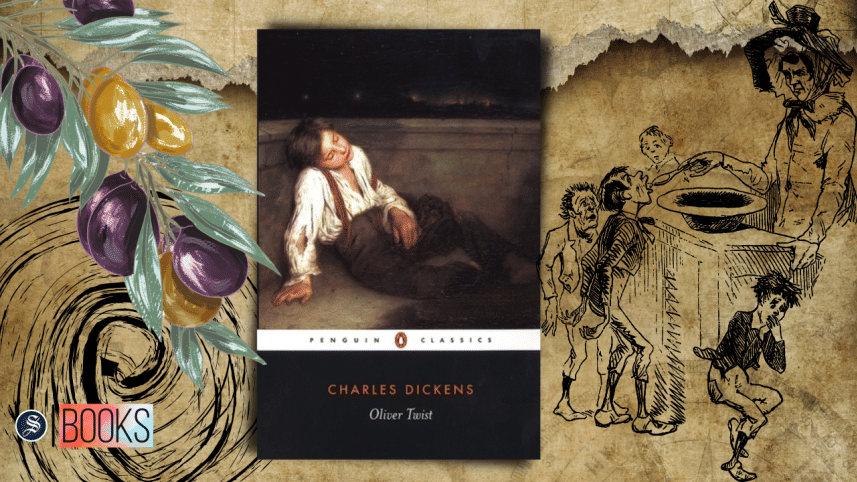Feeding desperation

"Please sir, I want some more", With these haunting words, Charles Dickens' critically acclaimed classic, Oliver Twist (first published 1838), beckons us into the grim world of 19th century England. In a society plagued by deep-seated inequalities and staggering poverty, the nexus between sustenance and social structure is laid bare. Hidden beneath a seemingly simple story of an orphan making his way through life are layers of societal hierarchy and the role food plays as both a biological necessity and a potent social construct.
Dickens, a literary luminary of his era, held up a mirror to the stark realities that were often concealed by his contemporaries. He exposes the vicious cycle where hunger and desperation divide society, laying bare the inequities perpetuated by an exploitative system. The lines between survival and moral boundaries blur, leading to a metaphorical and, at times, literal consumption of humanity itself. While others adorned the destitution of the era with a veneer of romanticism, Dickens seized the brush of unadorned reality. As we journey through Dickens' unflinching portrayal, the curtain lifts on a London that reveals the raw underbelly of its time.
The Industrial Revolution, a double-edged sword of progress, introduced the unspeakable exploitation of child labour. Children as little as five or six years old would work in coal mines, factories, laundry houses, and shipyards, sweep chimneys, or even resort to picking pockets and in worst case scenarios, prostitution. The poor and homeless had no choice but to sell their labour to survive. In exchange for the roof over their heads and a morsel of food at the end of the day, they would push themselves to extremes. This inevitably led to inhumane conditions for these workers who worked themselves to death and got almost nothing in return.
Oliver Twist begins with an orphan boy, Oliver, being born at one of these workhouses. The boys at the workhouse are fed so little that they are constantly hungry- "The bowls never wanted washing. The boys polished them with their spoons till they shone again...they would sit staring at the copper, with such eager eyes, as if they could have devoured the very bricks of which it was composed... boys have generally excellent appetites." There was never nearly enough food to sustain them.
After enduring such harrowing deprivations for months, one boy, who was not used to this way of life could not take it anymore and hinted darkly to his companions that "unless he had another basin of gruel per diem, he was afraid he might some night happen to eat the boy who slept next him, who happened to be a weakly youth of tender age." Starvation led them to such a desperate state that they would even consider cannibalism.
However, food's role doesn't stop at the precipice of starvation; it extends its influence even into the world of crime. The unprotected, neglected, starved and beaten children are led to thieving and robbery in order to eat and survive. Dickens brilliantly portrays how desperation and starvation can make people do things they never thought possible. This basic need for survival divides them into classes and creates an endless cycle of violence as each tries to make it in a hard world which doesn't even allow one a morsel of food. It comes to a point when human beings start feeding on each other in order to survive, both metaphorically and literally.
In Dickens' novel, the pickpockets who steal personal objects from other people can be interpreted as committing material cannibalism. By taking something that belongs to another person, usually something that they treasure a lot and is critical to their identity like a wallet or an embroidered handkerchief, they are essentially feeding on that person's identity and purpose. There is also a kind of poetic justice to how these pickpockets mostly steal from people of the upper or middle class. Their actions, paradoxically, mirror a grasping desire to acquire attributes reserved for the privileged- a bid to be acknowledged in a society that disregards their existence. Pitting the poor against the bourgeois state, Dickens exposes the abuses of Victorian capitalism through topical social criticism.
In the end, food is more than sustenance in Oliver Twist; it's a mirror reflecting the disparities, desperation, and moral decay of a society entangled in its grasp. Dickens exposes the chilling plight of Victorian children, their identities snatched, and their youth squandered in workhouses that were nothing short of modern-day tombs, until all they have left are death and starvation. At the heart of it all stands Oliver Twist, a beacon of innocence in a world tainted by hunger and greed. His journey becomes a testament to the transformative power of food, not just as a physical requirement but as a force that shapes destinies and reveals truths. The young protagonist's quest for sustenance morphs into an unwitting quest for justice and fairness, each morsel representing not just a meal, but a reclamation of dignity.
Sara Kabir is currently studying MLitt in English Literature: Fantasy at the University of Glasgow. Send her tips on how to survive Grad school @scarletfangirl on Instagram.



 For all latest news, follow The Daily Star's Google News channel.
For all latest news, follow The Daily Star's Google News channel. 


Comments